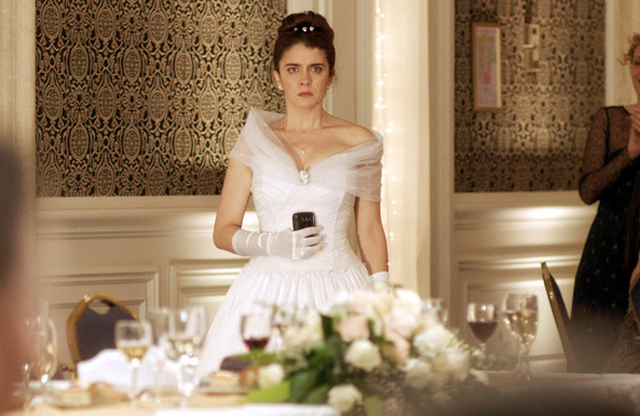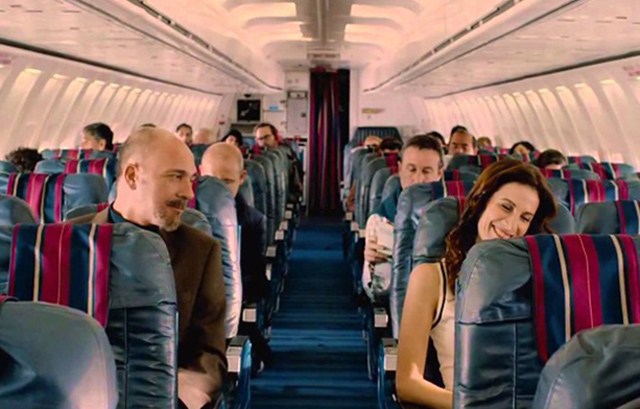 Rating: 5.0/5.0 |
CHICAGO– Road rage, parking fines and weddings are unlikely subjects designed to showcase criminal inhumanity, but “Wild Tales” – from Argentina – takes those common themes and provides some lessons on the breakdown of our civilizaton, in a momentous prologue and five stellar stories.
Personally, this is the nominated film that should have won the Best Foreign Language Film, because of its commonality and recognizable expression. After the audacious prologue, the titles are shown over animals in the wild, which in actuality we still are, and still inhabit. The five “wild tales” (“Relatos salvajes” in its native title) highlight murder, deception, betrayal, ignorance and the bliss of “civilization” that results from all of these societal ills. Yet as a whole it’s not a downer, because writer/director Damián Szifrón adds the spice of dark humor and a strange hope at the end. We are the sum of all our parts, but our animal instincts are really what has made us, and it remains a survival of the fittest.
The prologue of the film takes place on airliner, and the rest of the five stories are in the following situations – at a diner with a waitress and her cook (“Las Ratas”); two men on a lonesome highway (“El más fuerte); parking tickets and its victim (“Bombita”); a dire situation involving a hit-and-run (“La Propuesta”); and a wedding gone blissfully wrong (“Hasta que la muerte nos separe”).

I Knew the Bride (Érica Rivas) in ‘Wild Tales’
Photo credit: Sony Pictures Classics
Along the way there are bad decisions all over the place, social class warfare, the crassness of buying off others, the frustration of faceless government and the sauciest betrothal this side of “bridezilla.” All the stories are recognizable and many of the situations have been experienced, but here there are taken to another level. We have met the enemy, and they are us.
Like fine opera, each story leads into the other, in a biblical way. There is a a mordant progress to the vileness and reaction portrayed, but always with a wink and a nod towards an outside observation of absurdity – except in the hit-and-run story, which is a true indictment of cash for justice. Writer/director Szifrón is not so much a pessimist, but a realist, and allows the stories to define what can be real – with black humor – within the context of manmade institutions (parking, weddings, evening meals, etc.)
What is also apparent is how close everyone is to these various breakdowns. Fear and loathing are the common approaches to each of the situations, which are balanced every day on the edge of a knife. As human beings, we are constantly inventing rationalizations for each of our daily slights, and that in a sense is what prevents anarchy. It is our collective capitulation that forms our civilizations, as the themes of the stories seem to promote.
The performances are quite particular, with magnificent turns by Rita Cortese as the cook in the diner, Ricardo Darin as the frustrated receiver of parking tickets and Érica Rivas as The Bride. The way Rivas understands the emotions of a woman on her big day is magnificent, because when everything starts to go off the rails she seeks perfect revenge, with all the resultant psychological problems associated with the weird ritual of marriage.

About to Take Flight in ‘Wild Tales’
Photo credit: Sony Pictures Classics
And that is what works best in the anthology, the familiarity or the emotions. We are all terminal cases, but we are also inserted with our animal instincts, which is the will to survive when cornered, or at a least to give the finger to our own demise. That is what makes these films-within-the-film so delicious, the very human concept of plotting our positions in society, and when pushed, either accepting them or not. And with instant fame a click away on the “trending internet,” it can even result in a state of grace (“Bombita”).
“Wild Tales” also clarifies what the movies are all about – that wonderful reflection from the silver screen of who and what we are. Filmmakers are artists who often interpret the colors of the moment, even in the stupidest of films. The idea is to read the fine print underneath, that we are all signed in as wild animals, and we all can be victims within that state of being.
 | By PATRICK McDONALD |